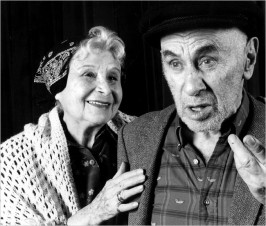Shifra Lerer, who was discovered at age 5 in Argentina by the great Yiddish actor Boris Thomashefsky and went on to become a winsome and wide-ranging trouper of the Yiddish theater for the next 90 years, died on Saturday in Manhattan. She was 95.
 Shifra Lerer and Felix Fibich in the Yiddish play “Green Fields”. As Yiddish troupes dwindled, Ms. Lerer seemed to be in nearly every show.
Shifra Lerer and Felix Fibich in the Yiddish play “Green Fields”. As Yiddish troupes dwindled, Ms. Lerer seemed to be in nearly every show.The cause was a heart attack and a stroke, said Hy Wolfe, a board member of the Hebrew Actors Union.
If not the last, Ms. Lerer was certainly among the few remaining actresses to have performed in the heyday of Yiddish theater, in the first half of the 20th century. Other stars of that era, like Mina Bern and Zypora Spaisman, have also died in recent years.
“They lived through the Holocaust times and emerged as young artists, and they adapted and continued to create in that diminished world,” said Eleanor Reissa, who directed Ms. Lerer in the Tony-nominated “Those Were the Days” in 1990. “They continued to devote themselves to the craft and the language that Hitler had attempted to murder.”
The versatile Ms. Lerer could be charming in comedic roles and plaintive in parts that demanded a feel for pathos. And she had a lovely voice for musical revues. She worked with many of the giants of Yiddish theater, among them Molly Picon, Maurice Schwartz, Jacob Ben-Ami and Joseph Buloff.
Her talent for portrayals of classic Jewish types was recognized by film directors like Woody Allen, who showcased her as a memorable grandma in “Deconstructing Harry” (1997), and Barry Levinson, who cast her in “Avalon” (1990) as a member of the timeless immigrant family that at Thanksgiving hears grumpy Uncle Gabriel, played by Lou Jacobi, become upset that “you cut the turkey without me!”
Ms. Lerer was born on Aug. 30, 1915, in Argentina, the daughter of a soap factory manager who had left the poverty and anti-Semitism of a Russian shtetl to “colonize” the Pampas under an agricultural grant from a fund established by the Jewish banker and philanthropist Baron Maurice de Hirsch. When she was 5, Mr. Thomashefsky went to Buenos Aires on a Yiddish theater tour and needed a child for a role. Ms. Lerer’s older sister, Miriam, suggested her, but cautioned that their father might object.
“You bring the girl, I’ll deal with the father later,” the commanding Mr. Thomashefsky said, according to Zalmen Mlotek, artistic director of the National Yiddish Theater-Folksbiene.
Ms. Lerer studied acting and violin in local Spanish-language conservatories but also found work in the local Yiddish theater. In 1943, after being invited to perform in a Yiddish play at the Parkway Theater in Brooklyn, she decided to live in New York. But it would take her six years to perform in Yiddish plays again as she waited for the Hebrew Actors Union to accept her at a time when the union was notorious for keeping competitors out. During the interlude she found singing roles in Vaudeville-like revues.
One evening she saw a performance by the Yiddish actor Ben-Zion Witler, who asked her to be his partner. Soon they were flying down to Buenos Aires. On the plane, Mr. Witler would compose songs he did not know how to transcribe, and Ms. Lerer would remember the melody for later transcription. They married and toured postwar Europe and the new land of Israel.
After he died of a brain tumor in 1961, she married the Yiddish actor Michael Michalovic, another Argentine, with whom she toured the United States. He died in 1987. She had no children and left no immediate survivors.
As the Yiddish theater dwindled to a company or two, Ms. Lerer seemed to be in almost every show, playing a variety of small or starring roles in the schmalziest of melodramas and in such classics of the Yiddish theater as “Yoshe Kalb,” “Yoshke Muzikant” and “Green Fields.”
She was “the kind of actress and performer we will never see again because of her understanding of Jewish life,” Mr. Mlotek, the director, said.
“She lived through Jewish suffering, and her performance was always touched with that.”
